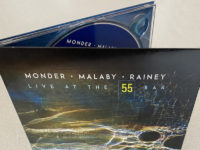With some members of David Bowie’s Blackstar band such as Donny McCaslin and Mark Guiliana making recent nods toward Bowie’s eccentric pop, the backing band’s guitarist takes a decidedly different path. Day After Day is his long-contemplated covers album — as well as (half) solo guitar album — and the Thin White Duke’s imprint is nowhere to be found on this substantial collection.
Made possible by a grant from the Shifting Foundation, Day After Day is Monder’s strongest statement as an interpreter, one that he didn’t undertake lightly. The first disc of this two-disc set is him unaccompanied and each performance’s arrangement was meticulously plotted. The second disc is all covers, too, but performed with Monder’s Matt Brewer/Ted Poor bass/drums rhythm section.
If anything, Monder is showing some of the influence by another recently deceased boss who is also a legend: Paul Motian. The drummer and bandleader led groups that knew how to abstract harmony without robbing it of any of its emotional impact. Like another Motian protégé and guitarist Bill Frisell, Monder has this rare ability to do that effortlessly with no accompaniment using an instantly recognizable language.
Disc 1 contains a lot of Hollywood tunes and softer pop tunes from the 50s and 60s. Henry Mancini’s “Dreamsville” is all about basking in the melody and the guitar’s shimmering resonance of the chords. Originally performed by Nat King Cole for the film The Scarlet Hour, “Never Let Me Go” in Monder’s hands gets subtly reharmonized with some darkened chords inserted. The evergreen “My One and Only Love” is played unhurriedly and hushed, and Monder nimbly juggles the rhythm and lead parts simultaneously.
The Burt Bacharach anti-Vietnam War paean “The Windows of The World” was only a minor hit for Dionne Warwick back in ’67 but Monder pays loving tribute to it with a guitar as sensitive as Warwick’s vocal. Later it’s extended by a foray into dissonance that culminates with the storm clouds he builds bursting open and returning to the song’s innocent motif like nothing happened.
Quincy Jones’ “The Midnight Sun Will Never Set” is a gorgeous jazz ballad and Monder’s ringing notes does this song justice, and then shifts to the repeating two chords from Bill Evans “Peace Piece” while punctuating it with chimes.
Disc 2 was recorded a little earlier, by the trio. The songs draw from a slightly later period, but they’re still old tunes of varying obscurity. The 1969 Glenn Campbell hit “Galveston” is put on a steady groove and Monder handles the lyrical parts with loads of grace, shifting to a stinging tone on a new bridge that actually rocks out. Bread’s “Guitar Man” is played with the same sway as the orignal but Brewer on acoustic bass and Monder playing clipped notes give this 70s hit a different vibe altogether.
Maybe it’s inevitable that a Beatles song gets covered, but “Long, Long, Long” is a left field choice. I never did care for that tune, but I appreciate it a little bit better now because Monder found a certain elegance to it missing from George Harrison’s original. Like the Beatles, sooner or later Dylan gets covered too, but “Just Like A Woman” is much better known. Here, Monder mans a acoustic guitar that lends a folksier feel this song begs for. The other acoustic guitar feature is used for a Fleetwood Mac song, the little-known Danny Kirwan soft rock number “Dust” in a moment when Fleetwood Mac actually did sound like Dylan, and Monder tackles this song in a similar manner.
“Day After Day” is the Badfinger single from which this album takes its name, and like all the songs of the first disc, this one is performed with guitar alone. Monder turns the song into a majestic soundtrack for a space movie, his heavily reverberating guitar beset by so much the symphonic effects, you have to strain to hear the melody but you’ll do that while enjoying the ‘big room’ sound.
Day After Day is now available from Sunnyside Records.
- Jeff Oster, Vin Downes + Tom Eaton – ‘Seven Conversations’ (2024) - May 6, 2024
- David Torn – ‘Adityahridayam 321’ (2024) - May 5, 2024
- Ivo Perelman + Matthew Shipp – ‘Magical Incantation’ (2024) - May 4, 2024




